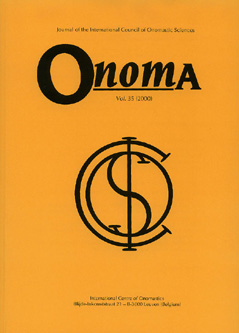 previous article in this issue previous article in this issue |

|
Document Details : Title: Bilingual Occitan Signage in Conflict Subtitle: The Curious Case of Villeneuve-lès-Maguelone Author(s): DIVER, Laura Carmel Journal: Onoma Volume: 46 Date: 2011 Pages: 275-299 DOI: 10.2143/ONO.46.0.2975538 Abstract : This paper examines how the conflict in the linguistic policies of the State and Region are demonstrated through the linguistic landscape (LL). It discusses the use of the Occitan language in bilingual signage in France and how this might aid in the revitalization of the language. This paper also shows the importance of linguistic policy as regards the LL and the impact which such policy, or lack thereof, can have upon the LL and regional languages. Two case studies are used to illustrate these issues. Firstly, the use of Occitan in the city of Toulouse in the Midi-Pyrénées region of Southern France was studied, as this reflects the conflict between state and regional policy towards the regional languages and serves as an example of how the LL can be used to help revitalize an endangered language. Secondly, the case of Villeneuve-lès-Maguelone, a town near Montpellier in the neighbouring Languedoc-Roussillon region, is examined. This town has become the centre of attention not only for those concerned with Occitan and the other French regional languages but also those concerned with the representation of the language in the LL, as it was this town which has served as the catalyst for the creation of new legislation ensuring that regional languages may be used in the LL in France. L’article étudie comment le conflit entre les politiques linguistiques de l’État et de la Région sont mis en évidence dans le paysage linguistique. Il discute de l’usage de la langue occitane dans la signalisation bilingue en France, et comment il peut aider à revitaliser la langue. Il montre aussi l’importance de la politique linguistique par rapport au paysage linguistique, ainsi que l’impact que cette politique ou son absence peut avoir sur le paysage linguistique et les langues régionales. Deux études de cas sont mises en oeuvre pour l’illustrer. D’abord, l’usage de l’occitan dans la ville de Toulouse, en Région Midi-Pyrénées dans le sud de la France, sera étudié car il reflète le conflit entre les politiques de l’État et de la Région envers les langues régionales, et il permet de montrer comment le paysage linguistique peut être utilisé pour revitaliser une langue en voie de disparition. Ensuite, le cas de Villeneuve-lès-Maguelone, ville près de Montpellier dans la Région voisine de Languedoc-Roussillon, est étudié. Cette ville a attiré l’attention, non seulement de ceux qui s’intéressent à l’occitan et aux autres langues régionales de France, mais aussi de ceux qui s’intéressent à la représentation de la langue dans le paysage linguistique, car cette ville a servi de catalyseur pour la mise en place d’une nouvelle législation garantissant que les langues régionales puissent être utilisées dans le paysage linguistique de la France. Dieser Beitrag untersucht, wie der Konflikt zwischen staatlicher und regionaler Politik durch die linguistische Landschaft (LL) widergespiegelt wird. Er diskutiert den Gebrauch der okzitanischen Sprache in der zweisprachigen Beschilderung Frankreichs sowie die Frage, wie dies die Wiederbelebung der Sprache unterstützen könnte. Dieser Aufsatz stellt außerdem die Bedeutung der Sprachpolitik hinsichtlich der LL dar sowie die Auswirkungen, die ein Verfolgen oder Nicht-Verfolgen einer solchen Politik auf die LL und Regionalsprachen haben kann. Zwei Fallstudien werden zur Illustration herangezogen: Erstens wurde der Gebrauch des Okzitanischen in der Stadt Toulouse in der südfranzösischen Region Midi-Pyrénées untersucht, da dieser den Konflikt zwischen staatlicher und Regionalpolitik gegenüber den Regionalsprachen reflektiert und als ein Beispiel für eine mögliche Nutzung der LL dienen kann, eine gefährdete Sprache wiederzubeleben. Zweitens wird der Fall Villeneuve-lès-Maguelone analysiert, eine Stadt in der Nähe von Montpellier in der benachbarten Region Languedoc-Roussillon. Diese Stadt hat nicht nur die Aufmerksamkeit von denen auf sich gezogen, die mit dem Okzitanischen und den anderen französischen Regionalsprachen zu tun haben, sondern auch von denen, die sich mit der Repräsentation der Sprache in der LL beschäftigen. Es war diese Stadt, die als Katalysator für eine neue Gesetzgebung diente, die den Gebrauch von Regionalsprachen in der LL Frankreichs absichern soll. |
|
